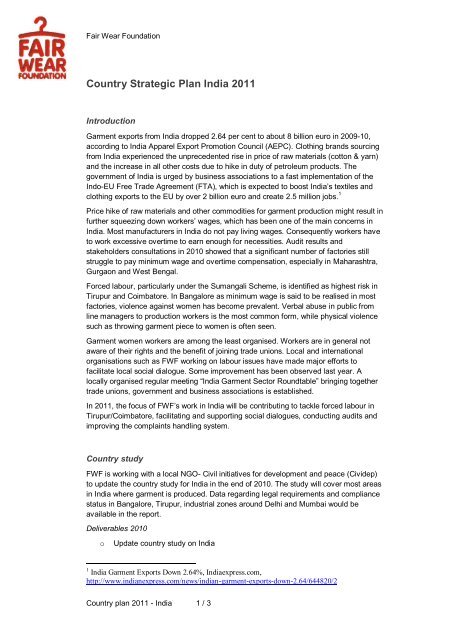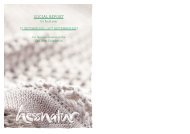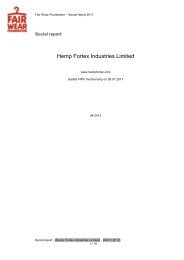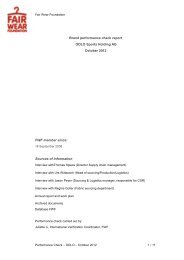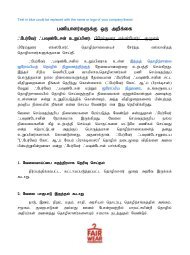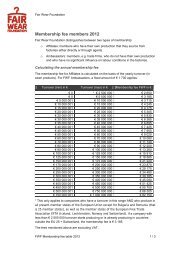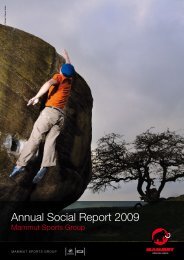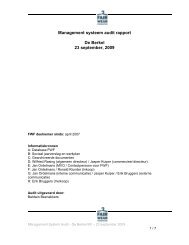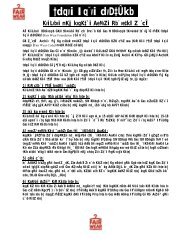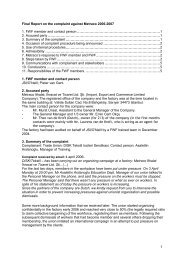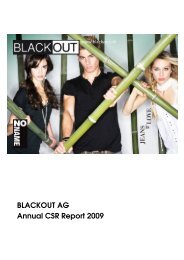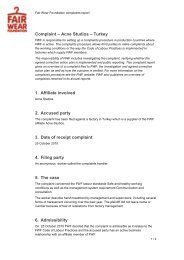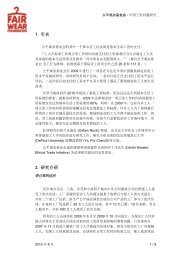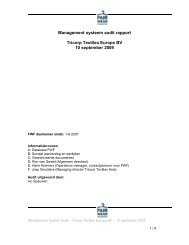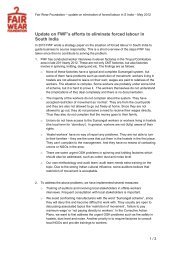Country Strategic Plan India 2011 - Fair Wear Foundation
Country Strategic Plan India 2011 - Fair Wear Foundation
Country Strategic Plan India 2011 - Fair Wear Foundation
Create successful ePaper yourself
Turn your PDF publications into a flip-book with our unique Google optimized e-Paper software.
<strong>Fair</strong> <strong>Wear</strong> <strong>Foundation</strong><br />
<strong>Country</strong> <strong>Strategic</strong> <strong>Plan</strong> <strong>India</strong> <strong>2011</strong><br />
Introduction<br />
Garment exports from <strong>India</strong> dropped 2.64 per cent to about 8 billion euro in 2009-10,<br />
according to <strong>India</strong> Apparel Export Promotion Council (AEPC). Clothing brands sourcing<br />
from <strong>India</strong> experienced the unprecedented rise in price of raw materials (cotton & yarn)<br />
and the increase in all other costs due to hike in duty of petroleum products. The<br />
government of <strong>India</strong> is urged by business associations to a fast implementation of the<br />
Indo-EU Free Trade Agreement (FTA), which is expected to boost <strong>India</strong>’s textiles and<br />
clothing exports to the EU by over 2 billion euro and create 2.5 million jobs. 1<br />
Price hike of raw materials and other commodities for garment production might result in<br />
further squeezing down workers’ wages, which has been one of the main concerns in<br />
<strong>India</strong>. Most manufacturers in <strong>India</strong> do not pay living wages. Consequently workers have<br />
to work excessive overtime to earn enough for necessities. Audit results and<br />
stakeholders consultations in 2010 showed that a significant number of factories still<br />
struggle to pay minimum wage and overtime compensation, especially in Maharashtra,<br />
Gurgaon and West Bengal.<br />
Forced labour, particularly under the Sumangali Scheme, is identified as highest risk in<br />
Tirupur and Coimbatore. In Bangalore as minimum wage is said to be realised in most<br />
factories, violence against women has become prevalent. Verbal abuse in public from<br />
line managers to production workers is the most common form, while physical violence<br />
such as throwing garment piece to women is often seen.<br />
Garment women workers are among the least organised. Workers are in general not<br />
aware of their rights and the benefit of joining trade unions. Local and international<br />
organisations such as FWF working on labour issues have made major efforts to<br />
facilitate local social dialogue. Some improvement has been observed last year. A<br />
locally organised regular meeting “<strong>India</strong> Garment Sector Roundtable” bringing together<br />
trade unions, government and business associations is established.<br />
In <strong>2011</strong>, the focus of FWF’s work in <strong>India</strong> will be contributing to tackle forced labour in<br />
Tirupur/Coimbatore, facilitating and supporting social dialogues, conducting audits and<br />
improving the complaints handling system.<br />
<strong>Country</strong> study<br />
FWF is working with a local NGO- Civil initiatives for development and peace (Cividep)<br />
to update the country study for <strong>India</strong> in the end of 2010. The study will cover most areas<br />
in <strong>India</strong> where garment is produced. Data regarding legal requirements and compliance<br />
status in Bangalore, Tirupur, industrial zones around Delhi and Mumbai would be<br />
available in the report.<br />
Deliverables 2010<br />
o Update country study on <strong>India</strong><br />
1 <strong>India</strong> Garment Exports Down 2.64%, <strong>India</strong>express.com,<br />
http://www.indianexpress.com/news/indian-garment-exports-down-2.64/644820/2<br />
<strong>Country</strong> plan <strong>2011</strong> - <strong>India</strong> 1 / 3
<strong>Fair</strong> <strong>Wear</strong> <strong>Foundation</strong><br />
Audit training and audits<br />
<strong>India</strong> has one of the most experienced FWF audit teams. Difference in languages and<br />
regulations in different states can be a challenge to social audits. There are eighteen<br />
recognised official languages, thought the principal official languages are Hindi and<br />
English. Most documents are written in English while workers usually speak only the<br />
local languages. FWF plans to organise an auditors training in North <strong>India</strong> (Hindi<br />
speaking area) to expend the capacity of the audit team.<br />
FWF will conduct 7 verification audits in <strong>India</strong>. Five of these will be done in the whole<br />
production chain of a fair trade certified garment in Tirupur. This is part of a pilot project<br />
of FWF and <strong>Fair</strong>trade Labelling Organizations to explore how verification approach can<br />
be applied further in the supply chain and how it contributes to improving working<br />
condition. The project is expected to contribute to solving the problem of forced labour in<br />
the area, as most cases happened in knitting mills which are seldom covered by social<br />
audits.<br />
Number of audits on behalf of affiliates is dependent on the companies themselves. This<br />
number will be available once the affiliates confirmed with FWF.<br />
Deliverables <strong>2011</strong><br />
o Auditors training in North <strong>India</strong><br />
o Seven audits will be carried out in <strong>India</strong><br />
Stakeholder consultation and engagement<br />
Engagement with local stakeholders is an essential part of FWF’s strategy. It will<br />
maintain cooperation with stakeholders and include their perspectives in updating the<br />
country study. Some stakeholders will continue to participate in audits and complaints<br />
handling.<br />
FWF will focus our work in South <strong>India</strong> on forced labour. Local and European<br />
stakeholders will be consulted on updates on the issue. Information and suggested<br />
strategies will be communicated to member companies who source from high risk areas.<br />
Deliverables <strong>2011</strong><br />
o Stakeholders consultation results will be available at the website of FWF<br />
Complaints procedure<br />
There are currently three FWF complaints handlers based in Karnataka, Tamil Nadu and<br />
North <strong>India</strong> respectively. Complaints handlers are able to communicate in Karnataka,<br />
Tamil and Hindi.<br />
FWF has not received many complaints in <strong>India</strong> in 2010. One of the basic requirements<br />
for an effective complaints system is an accessible and trustable complaints handler. To<br />
strengthen the complaints handling system and encourage workers to report on forced<br />
labour, FWF will recruit an extra complaints handler in Tirupur working with a local<br />
NGO-Social Awareness and Voluntary Education (SAVE). Addresses and names of the<br />
suppliers will be accessible to the complaints handler on a confidential basis. Logos of<br />
FWF members will be made available to all complaints handlers and local key<br />
stakeholders.<br />
Deliverables <strong>2011</strong><br />
<strong>Country</strong> plan <strong>2011</strong> - <strong>India</strong> 2 / 3
<strong>Fair</strong> <strong>Wear</strong> <strong>Foundation</strong><br />
o New complaints handler will be recruited in Tirupur<br />
o Small-scale pillot projects will be tested to improve the effectiveness of the<br />
complaints procedure<br />
Promotion of social dialogue<br />
FWF will keep contact with local initiated roundtable meeting organisers, such as the<br />
Tirupur Steering Group and the Garment Sector Roundtable. FWF will also provide<br />
support to the meetings by exchanging information and knowledge.<br />
Deliverables <strong>2011</strong><br />
o Updates on the activities regarding social dialogue will be reported on FWF’s<br />
website<br />
<strong>Country</strong> plan <strong>2011</strong> - <strong>India</strong> 3 / 3


